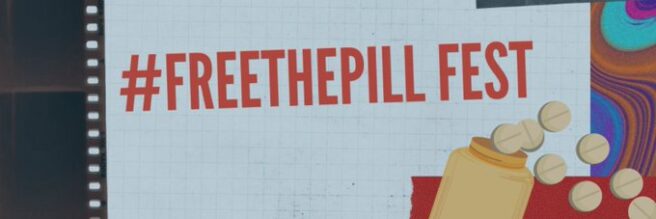Not Just Pregnancy Prevention: #FreeThePill Will Free Us
Posted by Guest Blogger
October 15, 2020

By: Sarah Michal Hamid
Birth control is not always used for pregnancy prevention, and that’s OK! What is not okay, is only centering pregnancy prevention in #FreeThePill discourse. There are multiple uses for birth control beyond pregnancy prevention, which is why we need to urgently improve birth control accessibility by bringing it over the counter. Centering pregnancy prevention in #FreeThePill narratives alienate QTBIPOC and LGBTQ2S+ people who may not use the birth control pill for pregnancy-related reasons, but still rely on the pill. LGBTQ+ people depend on contraceptives for a variety of reasons, and we should not be an afterthought in the movement for reproductive rights. By utilizing a reproductive justice framework within the #FreeThePill movement, reproductive rights advocates can adopt language and tools that seek to center LGBTQ2S+ folks, rather than ignore us.
While the widespread public perception surrounding users of the birth control pill typically presents cis straight women as the main users of the pill, this could not be further from the truth. Folks of all different gender and sexual identities use the birth control pill. Some use the birth control pill for pregnancy prevention, but many do not, and these experiences should be centered too. Trans, non-binary, and gender diverse communities very rarely see themselves represented within the #FreeThePill movement, yet still rely on the pill. For many gender diverse folks, the birth control pill can help alleviate dysphoria that is connected to menstruation, but we hardly see this benefit of the birth control pill discussed in the mainstream movement. Queer women who attempt to access contraception like the pill, are often met with stigma and barriers in the healthcare system, making it very difficult to obtain and use contraception effectively. These barriers are even more severe for queer women of color, who have to navigate both institutionalized medical racism and queerphobia. Many queer women of color unfortunately experience traumatic, dismissive, and abusive instances with their healthcare providers, which can both negatively impact their ability to receive the care/contraception they need as well as the likelihood that they will continue using it. The COVID-19 pandemic has exacerbated these barriers in healthcare access, particularly for queer women and women of color
The intersections between queerness and disability also impact many users of the birth control pill. As a queer woman of color with endometriosis, for years I relied on the birth control pill as a treatment for my disability and not pregnancy prevention. Deaf cisgender queer women are less likely to disclose their LGBTQ2S+ identity to a healthcare provider, even with an ASL interpreter, which can significantly impact their ability to communicate and obtain their contraception needs. If the birth control pill was brought over the counter, the barriers that exist in a healthcare provider setting would not limit someone from obtaining the pill. These stories are important to share because the most marginalized communities need over the counter birth control too, and we often face the most barriers in obtaining it.
Normalizing the use of birth control for non-contraception or pregnancy-related reasons will simultaneously help the destigmatization of QTBIPOC and LGBTQ2S+ folks who use contraceptives. By bringing birth control over the counter, almost all of the barriers that prevent us from obtaining the birth control pill would be eliminated. Our stories need to be centered, our health needs deserve to be met without stigma or fear because a reproductive rights movement that does not center QTBIPOC and LGBTQ2S+ communities is not a movement for us all. We need to #FreeThePill in order to free us all from a healthcare system that does not serve us, but our diverse identities and experiences must be recognized as we fight for reproductive justice.
Creator bio: Sarah Michal Hamid (she/her/hers) is a queer organizer, reproductive justice advocate, and transnational anti-imperialist decolonial feminist and settler in the Occupied Kingdom of Hawaiʻi. She is passionate about decolonization, the power of plants, ancestral knowledge, watercolor paintings, and feminist liberation.
Leave a Reply
You must be logged in to post a comment.

